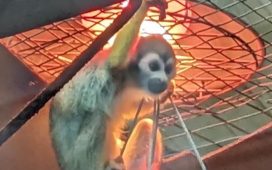Whether tossing pebbles between their paws or rolling stones on their chest and even into their mouth, otters are experts at rock juggling. Now researchers say the behaviour largely appears to be linked to a rumbling tummy.
Many species of otters are known to toss pebbles around, often while lying on their backs, in what appears to be an example of animals playing with inanimate objects. Mari-Lisa Allison, of the University of Exeter, said: “[I have seen] an otter at the fence putting a pebble through the mesh and then catching it underneath and rolling it round, round the fence”.
But quite why otters rock-juggle has been something of a conundrum. Now Allison and colleagues say their experiments back up the view that otters rock-juggle more when they are hungry.
“This seems to be the immediate driver of the behaviour. There, in that moment, they are rock juggling because they are hungry, they are anticipating food and they are getting excited,” said Allison. But, she noted, further research is needed. “The ultimate function is still quite a mystery,” she said.
Writing in the journal Royal Society Open Science, Allison and colleagues told of examining the behaviour of otters at three wildlife parks and zoos in the UK. The team recorded about 12 hours of observations for each of 48 otters, six of which were smooth-coated otters and 42 of which were Asian small-clawed otters.
The team note the small-clawed otters forage for shellfish and crabs, while the smooth-coated feeds on fish. This difference suggested the latter might juggle rocks more frequently as they relied on dexterous movements to a greater degree. However the team found no such difference, although they said that could be due to the small number of smooth-coated otters observed, adding that the two species did show different juggling actions.
Further analysis revealed that among otters aged 11 years or below, juggling was more frequent the younger the animal, suggesting, the team said, that the movements could help with the development of motor skills.
However, the behaviour was also common among senior otters. Perhaps, the team said, the juggling had a role in preventing cognitive decline, although more work is needed to explore the idea.
The researchers also found otters juggled more frequently if they had not been fed for two or more hours. The team said that that could support previous suggestions that rock juggling was a type of “misdirected foraging” – in other words the hungry otters could be performing the type of dexterous movements they would use when extracting meat from shellfish but on rocks or pebbles instead.
Yet rock juggling does not seem to be a way by which the otters practise or improve their skills. The team presented the otters with minced meat inside medicine bottles, tennis balls and between two plastic bricks, but those experiments gave no sign that otters who juggled more frequently had greater success with solving puzzles.
But the team say the experiment had limitations; many of the older otters were arthritic, and the animals could have been put off by the unfamiliar nature of the task or might not have understood the puzzle.
Prof Hannah Dugdale, of the University of Groningen, in the Netherlands, who was not involved in the work, welcomed the study. “The reason why otters juggle rocks has been difficult to study as there are many different variables that need to be considered at the same time, such as the age of individuals and how hungry they are,” she said, adding that the new study helped tease apart such factors.
But, she added, more work is needed to explore factors involved in rock juggling in wild otters, and its frequency, to fully understand the evolution of such behaviour.
Dr Elizabeth Chadwick, of Cardiff University, who is principal investigator of the Cardiff University Otter Project, also said questions remained. “Otters are absolutely captivating and rock juggling is one of their most intriguing behaviours,” she said. “The study helps explore and describe some of the differences in rock juggling between individuals, but is unable to provide the elusive answer as to why otters juggle.”














